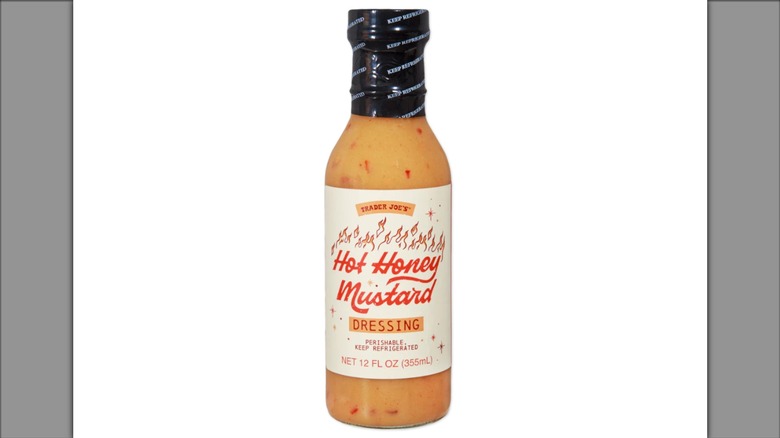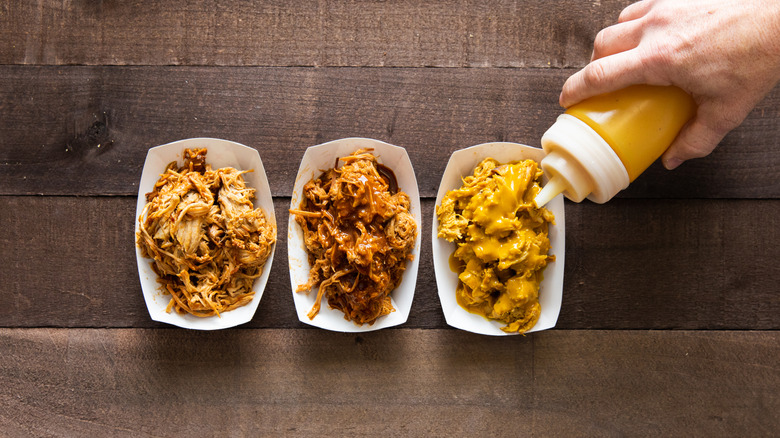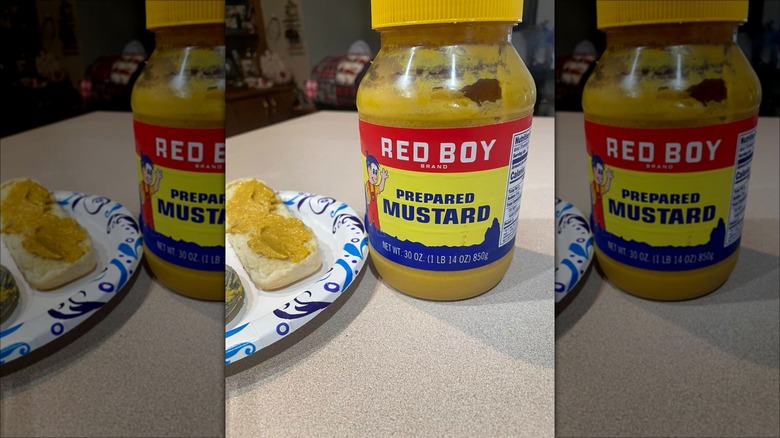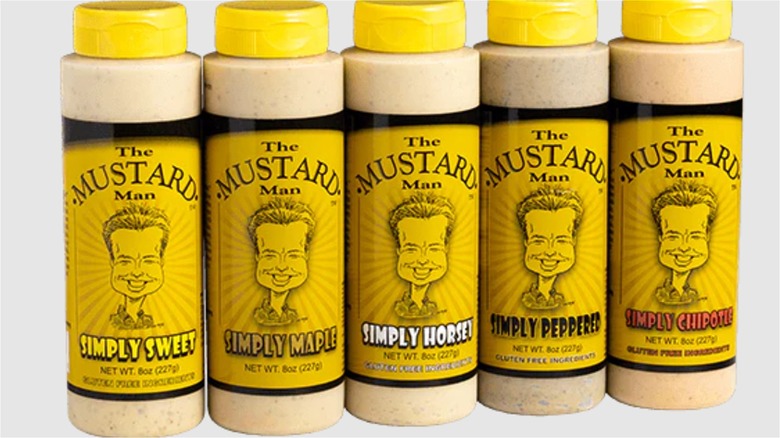The Biggest Mustard Recalls In US History
Mustard has a rich and exciting history spanning back to ancient times. This condiment also comes in lots of tasty varieties, with culinary applications ranging from topping dogs and burgers to marinating meats for maximum succulence. As such, it shouldn't be surprising that the global mustard market was valued at $6.87 billion in 2023, indicating a massive demand for this versatile condiment. However, with high production volume comes a risk of errors and oversights, which can lead to product recalls in an effort to protect consumers from potential harm.
We uncovered some of the biggest mustard recalls to hit the U.S. to better understand why and how product recalls happen. The examples in our list affected numerous states and involved large volumes of products. Different kinds of items are also represented, as the products include mustard-based barbecue sauce and salad dressing infused with hot honey. Food recalls in the U.S. are enacted voluntarily by manufacturers and/or distributors and are overseen by the USDA's Food Safety and Inspection Service. While such decisions can be alarming, in many cases they result from robust testing and investigation aimed at keeping consumers safe.
Trader Joe's hot honey mustard dressing
Hot honey has risen in popularity over the last few years, as this sweet-spicy ingredient is the perfect accompaniment to pizza, wings, and more. Trader Joe's got in on the action with its Hot Honey Mustard Dressing, a multipurpose condiment suitable for dipping snacks and glazing grilled meats. However, in March 2025, the chain experienced a small setback when it was determined the label on TJ's dressing failed to disclose the presence of wheat, soy, peanuts, and sesame, which are all major allergens. While sold under the Trader Joe's brand, the store's Hot Honey Mustard Dressing was manufactured by Fresh Creative Foods, which initiated the recall.
Overall, 17 states plus Washington, D.C. were affected, including Virginia, Texas, South Carolina, Pennsylvania, Oklahoma, Ohio, New Mexico, North Carolina, Maryland, Massachusetts, Louisiana, Kansas, Georgia, Florida, Delaware, Colorado, and Arkansas. Fortunately, there were no reports of customer illness related to the labeling discrepancy. Undeclared allergens might not seem like a major issue, but estimates show that food allergies affect 33 million Americans, and more than half of adults with food allergies were subject to a severe reaction as a result. Accurate food labels are crucial for people with allergies, and companies must take fast action to alert consumers when packaging is misleading.
Publix Deli Carolina-style mustard BBQ sauce
The uniqueness of Carolina-style barbecue can be partially attributed to the sauce used to flavor cuts of meat. Unlike the traditional molasses-based options, South Carolina-style sauce typically consists of mustard and tomatoes (or ketchup), as well as flavoring elements like pepper and vinegar. In addition to whipping up your own recipe, you can find plenty of ready-made brands at most grocery stores, including Publix, a Florida-based chain with locations primarily situated in the Southeastern portion of the U.S. Like many grocery chains, Publix offers private label store brands that are manufactured by third party companies. In 2024, a brand of barbecue sauce sold at the store was found to contain the incorrect product, which led to concerns about undeclared allergens.
Manufacturer Ventura Foods enacted the recall after learning bottles of its Deli Carolina-Style Mustard BBQ Sauce, created on behalf of Publix, actually contained Traditional Sweet & Spicy BBQ Sauce. Because the traditional sauce contained anchovy, which wasn't present on the label, there was a risk of allergic individuals inadvertently consuming the sauce and experiencing an adverse reaction. The product was distributed to Publix locations throughout seven states, including Tennessee, Alabama, Georgia, Virginia, North Carolina, Florida, and South Carolina. Thankfully, no instances of allergic reactions or illness were reported to Ventura Foods.
Keith Valley and Red Boy brand mustards
Mislabeled products put those with food allergies and intolerances at great risk, but bacterial contamination is equally concerning for all consumers. In late 2024, two mustard brands experienced the pain of a food recall firsthand when the presence of salmonella was discovered in the mustard seeds used to make the condiments. Keith Valley and Red Boy brands opted to collectively recall 960 cases of mustard as a result, though the FDA ultimately labeled the event as a Class III recall. While Class I recalls involve extremely hazardous products capable of causing serious health problems, Class III recalls have a much smaller risk of contributing to illness or injury among consumers.
The contaminated products were ultimately distributed to Arkansas, Texas, Kansas, and Oklahoma. It's not clear whether any consumers experienced illness as a result, but salmonella infections are linked to symptoms like fever, diarrhea, and nausea with occasional vomiting. Healthy adults can typically weather these symptoms with rest and increased fluid intake, and many people recover within a few days. For high-risk individuals, such as the elderly and people with compromised immune function, antibiotics may be necessary to stave off more serious issues.
The Mustard Man simply peppered mustard
In 2021, a Canton, Ohio-based condiment company dubbed The Mustard Man initiated a voluntary recall after a packaging error was detected. The problem involved bottles of the brand's Simply Peppered Mustard, which instead contained Simply Horsey Mustard. As a result, product labeling was inaccurate and did not correctly disclose allergens to consumers. It's estimated that 1,764 bottles of mustard were involved in the recall. Thankfully, no reports of adverse reactions or illness were received.
Mislabeled products were distributed to multiple retailers in the Canton area and other parts of Ohio, where the mustard was said to have been distributed to over 100 retail locations. The products also made their way to several other states, including North Carolina, Missouri, Pennsylvania, Florida, Indiana, Michigan, Illinois, and West Virginia. The Mustard Man's labeling error affected nearly 870 pounds of product, which is surely a substantial volume for a small brand. However, the company appears to have bounced back from its recall. Along with a website where patrons can purchase bottles of mustard directly, the business also operates a Facebook page that shows recent activity.




